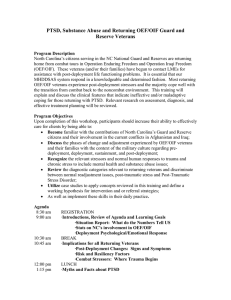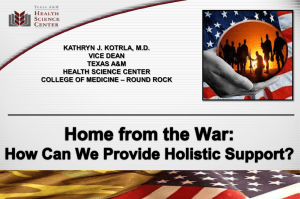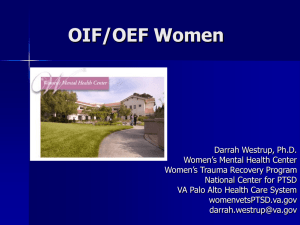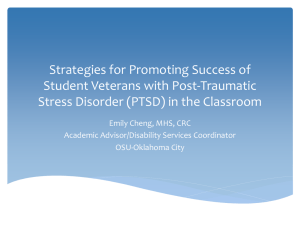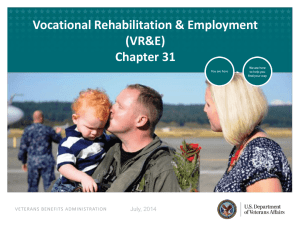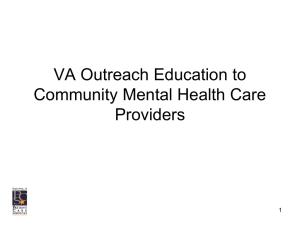GHB
advertisement
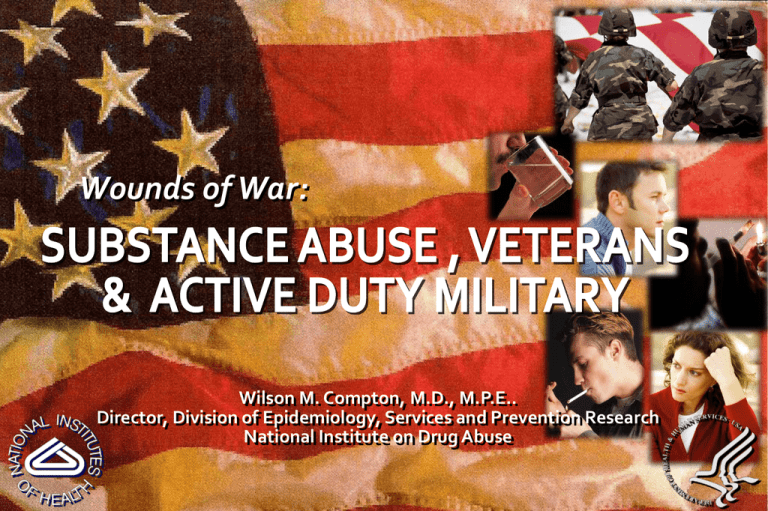
Wounds of War: Wilson M. Compton, M.D., M.P.E.. Director, Division of Epidemiology, Services and Prevention Research National Institute on Drug Abuse MH Problems in Veterans from Iraqi and Afghanistan Wars • Approximately 1.64 million U.S. troops deployed for Operations Enduring Freedom (OEF) and Iraqi Freedom (OIF) in Afghanistan and Iraq. • In these soldiers prolonged exposure to combat-related stress may be disproportionately high compared with the physical injuries of combat. • Specific concerns have been centered on post-traumatic stress disorder, depression, traumatic brain injury, suicide and SUD PTSD and Mental Health Diagnoses Among OEF/OIF Veterans Seen at VA Facilities Seal, KH et al., Arch Int Med 2007;167:476-482. New-onset PTSD Symptoms or Diagnosis 7.6% - 8.7% 1.4% - 2.1% 2.3% - 3.0% • • • • deployed with combat deploy without combat did not deploy Army Air Force Marine Corps Navy or Coast Guard OR=3.59 OR=3.38 OR=2.78 OR=2.48 43.5% of those w/ PTSD deployed with combat still had symptoms 3 years later PTSD three-fold higher among deployed with combat exposures Smith TC et al. for the Millennium Cohort Study Team. British Medical Journal. 2008 Feb;336(7640):366-71. Combat Exposure Is the Key Driver of Mental Health Problems Across Outcomes 70 60 50 40 30 20 Acute Stress Score Score Stress Acute 80 Soldiers who report high levels of combat are significantly more likely to screen positive for acute stress (PTSD symptoms) 0 2 4 6 8 10 12 14 16 18 20 22 24 26 28 Number of Combat Experiences Number of Combat Experiences Adapted from presentation by: MAJ Jeff Thomas, Walter Reed Army Institute of Research. PTSD or Depression with Serious Functional Impairment in Active Component and National Guard 3 and 12 Months Post Deployment Active Component National Guard Comorbidity common: Around 50% of those with Depression or PTSD also had alcohol misuse or aggressive behaviors. Thomas JL, et al..Arch Gen Psychiatry 2010;67:614-623 Post-Deployment Health Consequences 2,863 Iraq War returnees one-year post-deployment Twice as many sick call visits Hoge et al., AJP 2007;164: 150-153. Alcohol Use in Military Personnel • Excessive alcohol drinking and related harms are common among military personnel. • 43.2% of active duty military personnel reported at least one episode of binge drinking in the past month vs 26.1% for comparable age civilians (Stahre et al., Am J Preventive Medicine 2008). Binge Drinking Rates by Service, 2002 – 2005 (unadjusted results) DoD Survey of Health Related Behaviors Binge Drinking = 5 or more drinks on a single occasion at least once in in the past 30 days *Significant difference between 2002 and 2005 at .05 level. Civilian estimate for 1-4 years past High School reported from Monitoring the Future, past 2 weeks, 2004. Alcohol-Attributable Risk Behavior or Consequences in the Last 12 Months Among Current Drinkers in the Active Duty Military, 2005 Stahre, MA et al., Am J Prev Med 2009;36(3):208-217. Alcohol Misuse & Relationship to PTSD Hoge, et al. N Engl J Med. 2004;351:13-22. SUD for Past 30 Days for Total DOD * adjusted and unadjusted for socio-demographic characteristics for total Department of Defense, 1980–2005. Bray and Hourani Addiction 2007. Smoking in Military Personnel • Smoking rates are higher in the military than in the general population (32.2% vs 24.9% in 2005). Bray & Hourani. Addiction 2007;102:1092-1101; NSDUH, SAMHSA. • $130 million are spent annually by the military on excess training alone due to smokers that are prematurely discharged. • Service members who smoke have lower fitness levels and are at greater risk for physical injury. Smoking has been shown to be a coping mechanism for those exposed to stress. Smith et al., Am J Preventive Medicine 2008. Deployment was associated with an Increase in Smoking (OEF and OIF) • Deployment was associated with smoking initiation (1.2% versus 2.3% or a 70% increase). • Deployment was associated with smoking recidivism (31% relapse and was 38% higher than in those that were not deployed). deploying multiple times, and deployment >9 months increased risk of smoking reuptake Smith B et al. for the Millennium Cohort Study Team. Cigarette smoking and military deployment: a prospective evaluation. American Journal of Preventive Medicine, 2008 Dec;35(6):539-46. Illicit Substance Abuse in OEF/OIF Veterans less than in veterans of other wars • Drug use is a dischargeable offense • Stigma regarding drug abuse and mental health treatment within VA • SUD or Treatment may negatively impact career (e.g., security clearance) • Limited confidentiality regarding one’s medical records DoD Illicit Drug Use for Selected Drugs Past 12 Months, 2005* Hallucinogens 1.9 Amphetamines 1.4 Inhalants Heroin/Opium/Morphine/ Other Opiates Barbiturates 2.1 0.9 2.0 Analgesics 7.3 Tranquilizers 2.0 Cocaine 1.9 Marijuana 4.2 0 1 2 3 4 5 6 7 8 9 10 Percentage Note: 97% (total DoD) reported being tested for drug use in past 12 months. *Not comparable with estimates in prior survey years due to questionnaire changes--specific drug examples were added in 2005. Any Illicit drug use = Use of any drug asked about one or more times in the past 12 months for non-medical purposes (overall rate for any drug use = 10.9%, excluding steroids). 2005 Dept of Defense Survey of Health Related Behaviors Among Active Duty Military Personnel Deployment Length: Divorce/Separation Intentions • Soldiers’ reports of whether they plan to get a divorce or separation increase with each month of the deployment. U.S. Army Mental Health Advisory Team (MHAT) V Report (2007) for Iraq and Afghanistan Additional Problems in Veterans from the Iraqi and Afghanistan Wars • As a result of improvements in battlefield medicine 90% of severely wounded soldiers survive and face additional challenges imposed by significant PAIN. • Chronic pain increases the risk of mental health disorders including substance abuse disorders. Peoples et al., NEJM 2004. • Exposure to opiate medications for the treatment of chronic pain can results in opiate addiction. Traumatic Brain Injury Veterans (OEF and OIF) • Mild Traumatic Brain Injury (TBI) has been reported in 12-18% of soldiers evacuated from Iraq and Afghanistan (Carson study: 1 in 6 shows TBI symptoms. Associated Press. April 11, 2007). • Mild TBI occurring among soldiers deployed in Iraq is strongly associated with PTSD and poorer physical health 3 to 4 months after returning home (Hoge CW et al., NEJM 2008). • NO information regarding its effects on SUD. Brain Areas Affected by TBI Diffuse Axonal Injury Subdural Hemorrhage Contusions Orbitofrontal Cortex Taber et al., J Neuropsychiatry Clinical Neuroscience 2006. The orbitofrontal cortex is disrupted in addicted subjects and this may contribute to their vulnerability Volkow et al., Neuropharmacology 2009. for SUD Research Shows that Social Stressors Can Have Profound Effects on Illicit and Licit Drug Use 1. Facilitate Initiation 2. Increase Risk of Addiction 3. Trigger Relapse Research Shows that Social Stressors Can Have Profound Effects on Illicit and Licit Drug Use Who else is affected? Spouses Families Communities Additional Problems in Veterans • Nearly one-quarter of Gulf War veterans had been incarcerated at some point. • Ever incarcerated veterans had a higher frequency of psychiatric & medical co-morbidity. • Ever incarcerated status was associated with having used illegal drugs. • Incarceration dramatically increased suicide risk (5-6 fold) & this risk is greater in individuals with SUD (Wortzel et al., J Am Acad Psychiatry Law 2009, Shaw et al., Br J Psychiatry 2004). Population Penetration Gap in Need Vs. Service Got help (past 12 months) Acknowledge a problem 78-86% Want help 38-45% Any professional 23-40% Mental health professional 13-27% STIGMA is the Main Perceived Barriers to Seeking MH Services Among Respondents Who Met Criteria for a Mental Disorder Hoge, et al. N Engl J Med. 2004;351:13-22. 24 January 6-7, 2009, In Collaboration with: U.S. Department of Defense Army Medical Research and Materiel Command Department of Defense Health Affairs Army Center for Substance Abuse Programs U.S. Department of Veterans Affairs Other NIH Institutes: NCI, NIMH, NIAAA, NHLBI Meeting Goals • gain an understanding of the intervention needs of military personnel, veterans, and their families regarding SUD • discuss prevention and treatment approaches being used and their evidence base • how to successfully conduct research in military and veteran settings • help formulate a research agenda • Basic unanswered research questions • Vulnerability • Stimulant use in military operations Substance Use and Abuse Among Military Personnel, Veterans & Their Families (2010 NIDA RFA with NIAAA, NCI & Dept. of Veterans’ Affairs) BACK, SUDIE E -- Integrated Treatment of OEF/OIF Veterans with PTSD and Substance Use Disorders R01 DA030143 GEWIRTZ, ABIGAIL -- Effectiveness of a Web-enhanced Parenting Program for Military Families R01 DA030114 HUDSON, TERESA JO -- Use and Abuse of Prescription Opioids Among OEF/OIF Veterans R01 DA030300 LARSON, MARY JO -- First Longitudinal Study of Missed Treatment Opportunities Using DOD and VA Data DA030150 MCGOVERN, MARK P. -- Integrated CBT for Co-Occurring PTSD and Substance Use Disorders R01 DA030102 Substance Use and Abuse Among Military Personnel, Veterans & Their Families (2010 NIDA RFA with NIAAA, NCI & Dept. of Veterans’ Affairs) AMSTADTER, ANANDA B -- Stress-induced Drinking in OEF/OIF Veterans: The Role of Combat History and PTSD R01AA020179-03 GOLUB, ANDREW L -- Veteran Reintegration, Mental Health and Substance Use in the Inner-City R01AA020178 MARTENS, MATTHEW P -- Personalized Drinking Feedback Interventions for OEF/OIF Veterans R21AA020180 ROSENBLUM, ANDREW BRUCE -- Web-based CBT for Substance Misusing and PTSD Symptomatic OEF/OIF Veterans AA020181 MALONE, RUTH E -- Enhancing Civilian Support for Military Tobacco Control R01CA157014 Substance Use and Abuse Among Military Personnel, Veterans & Their Families (2010 NIDA RFA with NIAAA, NCI & Dept. of Veterans’ Affairs) DESAI, RANI A -- Gender Differences in Post-deployment Addictive Behaviors Among Returning Veterans CX000453. CURRAN, GEOFFREY -- An Ethnographic Study of Post-Deployment Substance Abuse and Treatment Seeking CX000452 BOYKO, EDWARD J -- Tobacco Use and Alcohol Misuse among Participants of the Millennium Cohort Study CX000450 OSLIN, DAVID W -- Integrated vs. Sequential Treatment for Post Traumatic Stress Disorder and Addiction Among Operation Enduring Freedom/Operation Iraqi Freedom Veterans CX000451 Where Do We Need to Go From Here? We Need to… Advance the SCIENCE and to… End the STIGMA & Discrimination
